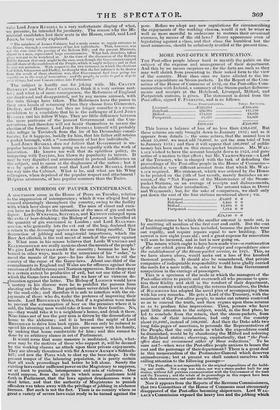LORDLY HORROR OF PAUPER INTEMPERANCE.
A DISCUSSION arose in the House of Peers on Tuesday, relative to the suppression of intemperance ; which it was alleged had in- creased alarmingly throughout the country, owing to the facility with which beer-shops are opened. The men of claret and cura- coa have no feeling for the infirmities of the men of gin and malt liquor. Lords WYNFORD, SUFFIELD, and KENYON enlarged upon the evils of beer-drinking ; the Bishop of LONDON is horrified at the quantity of gin consumed in London ; and Lord ELLENBO- ROUGH, who generally lets the cat out of the bag, declared that a return to the licensing system was the one thing needful. The destruction of jobbing and magisterial importance, which the Beer Act effected, is the real secret of much of the outcry against it. What man in his senses believes that Lords WYNFORD and ELLENBOROUGH are really anxious about the morals of the people? We give Lord SUFFIELD credit for sincerity ; because he has la- boured in other ways, much to the annoyance of his " order," to mend the morals of the poor—he has done his best to rid the country of the curse of the Game-laws. About one-third of the commitments in England and Wales are for offences against these creations of feudal tyranny and Norman oppression. Beer-shops may to a certain extent be productive of evil, but not one tithe of that which the Game-laws occasion. But we hear of no virtuous de- clamation against the latter. The Bishop of LONDON would have a mutiny in his diocese were he to prohibit the parsons from shooting and the chase. But gentlemen never drink beer in shops by the road-side; and therefore it is safe to interfere with the en- joyments of those who do, ender the pretence of improving their morals. Lord BROUGHAM thinks, that if a regulation were made to prevent the consumption of beer on the premises where it is sold, the labouring men would take it home to their families. No, no—they would take it to a neighbour's house, and drink it there. Nine times out of ten the poor man is driven by the discomforts of home to the alehouse; and it is beyond the might of Lord BROUGHAM to drive him back again. He can only be induced to spend his evenings at home, and his spare money with his family, by making that home comfortable for him ; and this cannot be done by an arbitrary clause in act of Parliament. It would seem that some measure is meditated, which, what- ever may be the motives of those who support it, will be deemed by the working classes an attack upon their private enjoyments. They are already threatened with Sir ANDREW AGNEW'S Sabbath- bill ; and now the Peers wish to shut up the beer-shops. In the present temper of the labouring population, it is pretty certain that all such proceedings had better be left alone. Surely the existing laws confer sufficient power on the Magistracy to suppress, or at least to punish, intemperance and acts of violence. One would suppose, from the style in which some gentlemen hold forth in Parliament, that the laws against drunkenness were a dead letter, and that the authority of Magistrates to punish offenders was taken away with the privilege of jobbing in alehouse licences. But such is not the fact. There is no country where so great a variety of severe laws 'exist ready to be turned against the
poor. Before we adopt any new regulations for circumscribing the enjoyments of the working classes, would it not be wiser as well as more merciful to endeavour to restrain their occasional excesses, by means of the old laws ? Every appearance even of legislating against a class, and that class the humblest but the most numerous, should be sedulously avoided at the present time.




















 Previous page
Previous page